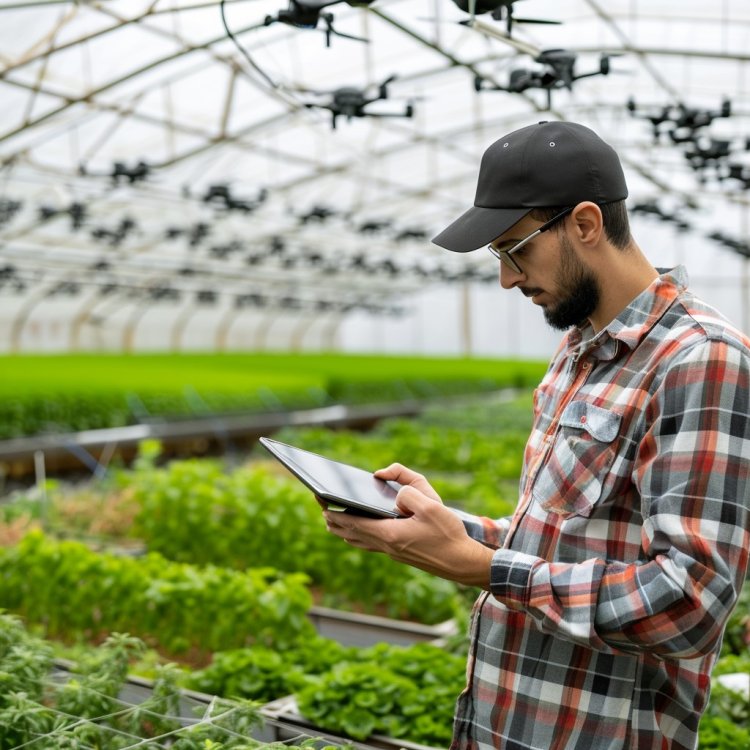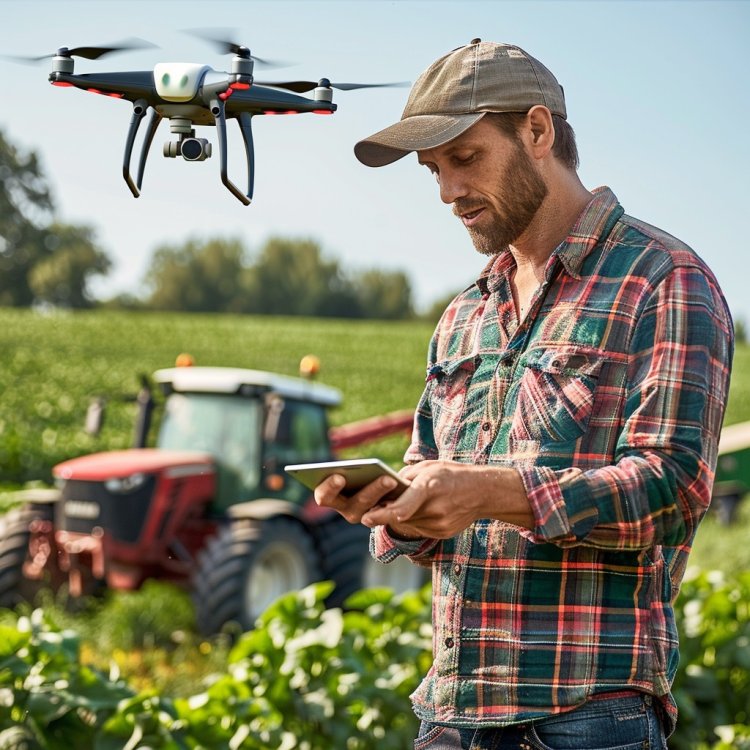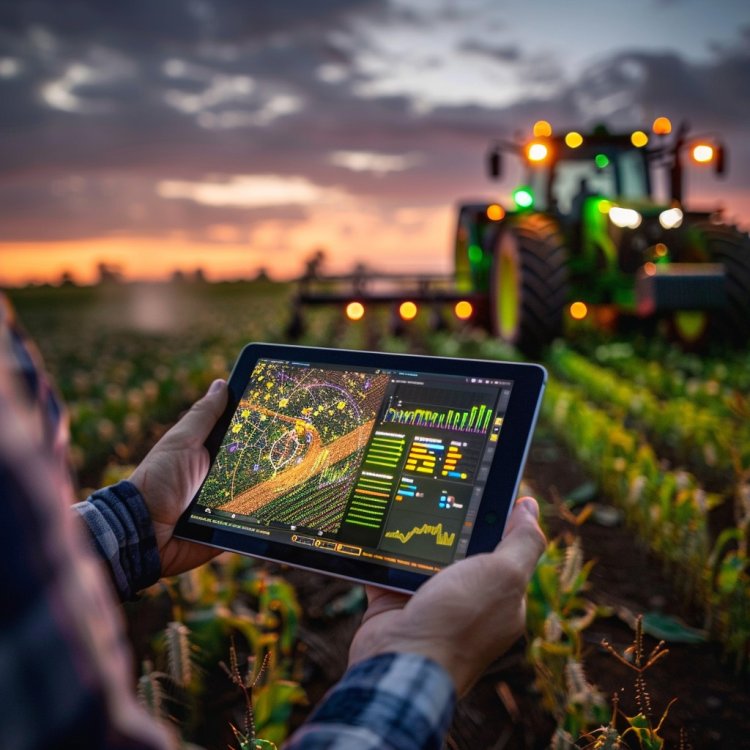The Rise of AgriTech Education: Training the Next Generation
Explore how online courses, apps, and VR tools are training farmers in precision agriculture and tech adoption, empowering the next generation of Farmers.

Introduction
As agriculture evolves with technology, the need for education in AgriTech—especially precision agriculture and tech adoption—has never been greater. We’re diving into how online courses, mobile apps, and virtual reality (VR) tools are empowering farmers with the knowledge to thrive in this digital era. Let’s explore how these tools are training the next generation of farmers in 2025 and beyond.

farmer VR precision agriculture
Online Courses: Accessible Learning for Farmers
Online courses are breaking down barriers, offering farmers flexible, affordable ways to learn about precision agriculture. These courses cover technologies like GPS-guided equipment, data analytics, and IoT sensors, which help optimize farming practices.
- Purdue University’s Precision Agriculture Course:
This online program provides in-depth knowledge on site-specific farming, blending science with practical applications. Weekly modules include video discussions with farmers successfully using these technologies, offering real-world insights.
- edX Agriculture Courses:
Platforms like edX offer courses on dynamic topics such as sustainability and AgriTech. For instance, the WBGx e-Learning on Digital Agriculture course teaches how ICT and data ecosystems can make farming profitable and sustainable, as defined by ICRISAT.
Harper Adams University’s Adopting Precision Technology Course:
This immersive course helps farmers develop a “Precision Vision” for their businesses, featuring interactions with industry leaders and a trip to the Netherlands to see precision agriculture in action.
These courses are particularly valuable for farmers who may lack formal education in tech, helping them bridge the gap between traditional farming and modern practices.
Mobile Apps: Learning on the Go
Mobile apps provide farmers with instant access to AgriTech education, often integrating practical tools for precision farming.
- EOSDA Crop Monitoring App: This app not only offers real-time data on crop health and soil conditions but also educates farmers on using satellite imagery and GIS for precision agriculture. Its educational resources help farmers understand how to interpret data for better decision-making.
- Farm Management Software Apps: Apps like those mentioned in McKinsey’s agtech adoption report (e.g., farm-management software with 21% adoption among farmers) often include tutorials on optimizing inputs like fertilizer and water, teaching farmers how to integrate precision agriculture into daily operations.
- Digital Extension Services: In sub-Saharan Africa, apps providing digital extension services are transforming education for smallholder farmers, as noted in a scoping review on ScienceDirect. These apps deliver timely information on precision farming techniques, improving productivity despite challenges like low digital literacy.
Apps are especially effective for farmers in remote areas, offering bite-sized learning that fits into busy schedules.
Virtual Reality (VR) Tools: Immersive Training Experiences
VR tools are revolutionizing AgriTech education by providing hands-on, immersive learning without the risks of real-world trial and error.
- CropLife International’s VR Training Program: Thai farmers are using VR to learn safety practices, as reported by Farming First. By simulating scenarios like pesticide application, VR helps farmers practice in a controlled environment, achieving recall rates of 80% a year after training. Innovations like HindXR have reduced VR headset costs to $7 by using smartphones, making this technology more accessible.
- Case IH VR Training: This program allows farmers to learn how to operate complex machinery virtually, reducing training costs and increasing knowledge retention, as highlighted by Capsule Sight. It’s a game-changer for farmers adopting precision agriculture equipment.
- Immersive LD and FarmVR: Companies like Immersive LD and FarmVR are developing VR simulations for broader agricultural tasks, from equipment operation to crop management. These tools help farmers visualize the impact of precision farming techniques, such as optimizing irrigation during a simulated drought.
VR’s ability to simulate real-world scenarios makes it a powerful tool for training farmers, especially in regions with limited access to human trainers.

farmer VR precision agriculture
Challenges and Opportunities
While these educational tools are transformative, challenges remain:
- Cost and Accessibility: High upfront costs for VR hardware and limited internet access in rural areas can hinder adoption, as noted in the U.S. GAO report on precision agriculture.
- Digital Literacy: Many farmers lack the skills to use these technologies, a barrier highlighted in the ScienceDirect review of digitalisation in sub-Saharan Africa.
- Scalability: Expanding these programs to reach smallholder farmers globally requires investment in infrastructure and training, as emphasized by the World Bank’s focus on digital agriculture.
Despite these hurdles, the opportunities are immense. Online courses, apps, and VR tools can democratize access to AgriTech education, empowering farmers to adopt precision agriculture, increase yields, and farm sustainably.
Conclusion
The rise of AgriTech education is equipping the next generation of farmers with the tools to succeed in a tech-driven world. We’re inspired by how online courses, mobile apps, and VR are making precision agriculture accessible to all. Whether you’re a seasoned farmer or just starting out, these resources can help you embrace the future of farming. Let’s grow smarter, together!
What's Your Reaction?





















